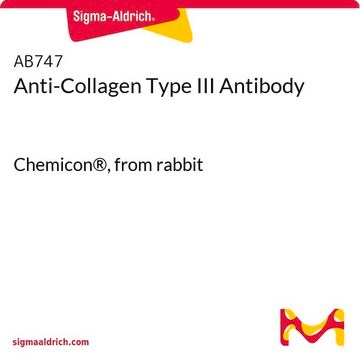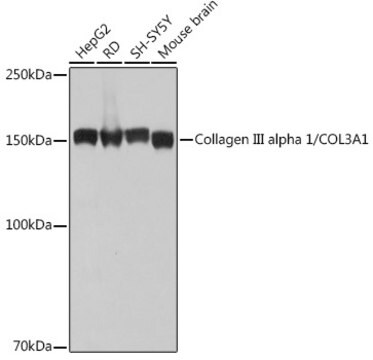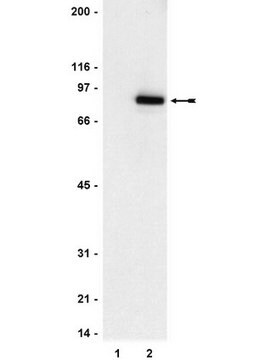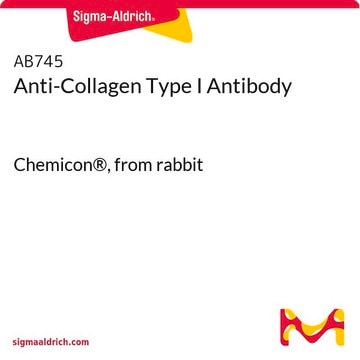ZRB1167
Anti-Collagen Type III Antibody, clone 3N18 ZooMAb® Rabbit Monoclonal

recombinant, expressed in HEK 293 cells
About This Item
Productos recomendados
biological source
rabbit
Quality Level
recombinant
expressed in HEK 293 cells
conjugate
unconjugated
antibody form
purified antibody
antibody product type
primary antibodies
clone
3N18, recombinant monoclonal
description
recombinant, expressed in HEK 293 cells
product line
ZooMAb® learn more
form
lyophilized
mol wt
calculated mol wt 138.56 kDa
observed mol wt ~200 kDa
purified by
using Protein A
species reactivity
human
species reactivity (predicted by homology)
monkey, mouse
packaging
antibody small pack of 25 μL
greener alternative product characteristics
Waste Prevention
Designing Safer Chemicals
Design for Energy Efficiency
Learn more about the Principles of Green Chemistry.
enhanced validation
recombinant expression
Learn more about Antibody Enhanced Validation
sustainability
Greener Alternative Product
technique(s)
ELISA: suitable
affinity binding assay: suitable
immunohistochemistry (formalin-fixed, paraffin-embedded sections): suitable
western blot: suitable
isotype
IgG
epitope sequence
C-terminal
Protein ID accession no.
UniProt accession no.
greener alternative category
, Aligned
shipped in
ambient
storage temp.
2-8°C
target post-translational modification
unmodified
General description
Specificity
Immunogen
Application
Evaluated by Western Blotting in HT1080 cell lysate.
Western Blotting Analysis: A 1:10,000 dilution of this antibody detected Collagen Type III in HT1080 cell lysate.
Tested applications
Immunohistochemistry (Paraffin) Analysis: A 1:100 dilution from a representative lot detected Collagen Type III in human skin tissue sections.
Affinity Binding Assay: A representative lot of this antibody bound Collagen Type III with a KD of 6.7 x 10-6 in an affinity binding assay.
ELISA Analysis: 300 μg/mL from a representative lot detected Collagen Type III in Collagen Type III in an indirect ELISA.
Note: Actual optimal working dilutions must be determined by end user as specimens, and experimental conditions may vary with the end user
Target description
Physical form
Reconstitution
Storage and Stability
Legal Information
Disclaimer
Not finding the right product?
Try our Herramienta de selección de productos.
Storage Class
13 - Non Combustible Solids
wgk_germany
WGK 1
flash_point_f
Not applicable
flash_point_c
Not applicable
Certificados de análisis (COA)
Busque Certificados de análisis (COA) introduciendo el número de lote del producto. Los números de lote se encuentran en la etiqueta del producto después de las palabras «Lot» o «Batch»
¿Ya tiene este producto?
Encuentre la documentación para los productos que ha comprado recientemente en la Biblioteca de documentos.
Nuestro equipo de científicos tiene experiencia en todas las áreas de investigación: Ciencias de la vida, Ciencia de los materiales, Síntesis química, Cromatografía, Analítica y muchas otras.
Póngase en contacto con el Servicio técnico








